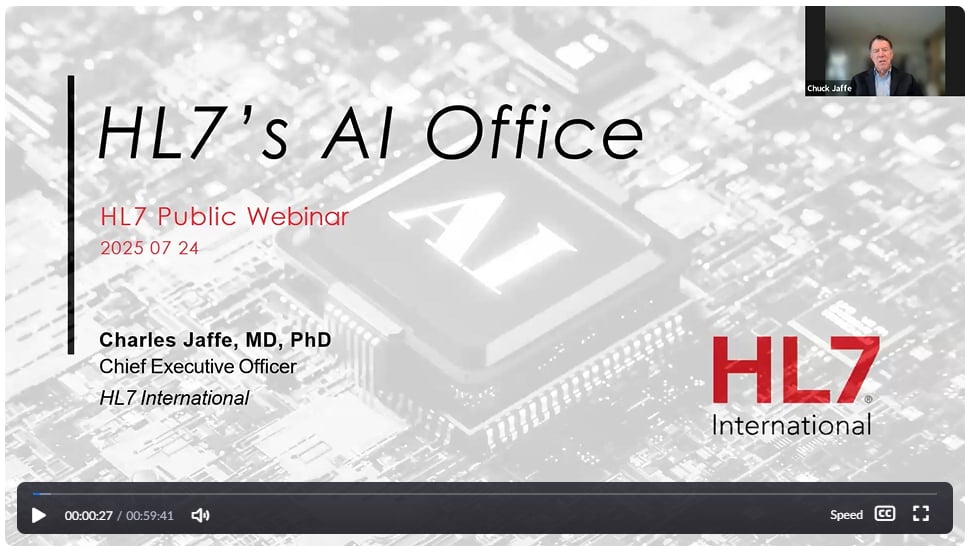HL7 AI
Office
HL7 Strategic Approach to AI
The AI office positions HL7 at the forefront of healthcare's AI revolution, creating frameworks that ensure emerging technologies are trusted, explainable, interoperable, and scalable across clinical, operational, and research settings worldwide. As artificial intelligence rapidly transforms healthcare, the AI Office will serve as the hub for aligning emerging technologies with ethical frameworks, building trusted infrastructure, and ensuring AI delivers meaningful improvements in care quality, accessibility, and outcomes.
Four Strategic Pillars
Standards
Building the AI-ready interoperability stack for safe, explainable AI with provenance capabilities that advance human health
Global Leadership
& Partnerships
Convening the worldwide AI+health community to align standards, shape policy, and accelerate responsible innovation
AI Innovation Lab
Incubating AI solutions to enhance member experiences, accelerate standards development, and pioneer new ways of working
Community Excellence
Empowering implementers with tools and best practices for responsible, standards-powered AI deployment
Chief Artificial Intelligence Officer

Daniel Vreeman DPT, FHL7
Daniel Vreeman - CAIO
To lead this initiative, HL7 has appointed Daniel Vreeman, DPT, as its first Chief AI Officer (CAIO). Dr. Vreeman will expand his current role as Chief Standards Development Officer to drive HL7's comprehensive AI strategy, including the HL7 AI Challenge, anti-fraud initiatives, and collaborations with regulators and industry partners globally.
HL7 Activities on AI
Use of AI to Counter Fraud and Improve Payment Integrity
- HL7 has produced a report providing a summary of current landscape and opportunities for improving the use of AI to improve payment integrity and reduce fraud, waste, and abuse, focusing on data access and interoperability needs, data governance frameworks, and implementation strategies
- Link to Report Page: Reducing Fraud and Improving Payment Integrity in Healthcare Through the Use of AI
AI Challenge
- This global innovation competition is designed to spotlight the transformative potential of AI when powered by open health data standards, with a focus on the use of HL7 standards to power AI applications that solve real-world clinical, operational, or equity-focused problems. Solutions may include, but are not limited to, clinical decision support, ambient documentation, population health, predictive analytics, or bias mitigation strategies.
- Link to Challenge: info.hl7.org/ai-challenge
The Billion Dollar Case for HL7: Why HL7 Is Healthcare's Strategic Investment Opportunity
-
HL7 International is the unseen infrastructure powering modern healthcare. For nearly four decades, it has set the global standards that allow hospitals, clinics and innovators to share health data seamlessly, driving efficiency, improving care and enabling innovation.
From EHRs to AI, HL7 ensures that information flows securely and consistently across systems. Its work prevents costly inefficiencies, supports trustworthy AI, and strengthens the entire healthcare market.
Discover how investing in HL7 isn’t just supporting a nonprofit, it’s funding the digital backbone of healthcare itself, an infrastructure that delivers measurable returns in innovation, interoperability and patient outcomes.
- Link to Article: The Billion Dollar Case for HL7: Why HL7 Is Healthcare's Strategic Investment Opportunity
AI Office Webinar
HL7 AI Work Groups
A list of existing AI projects is available in Confluence at: https://confluence.hl7.org/display/HAA additional work groups are invited to add their information to keep the HL7 Community up to date as well.

AI Talks
In HL7's AI Talks podcast series, hear from leading experts as they explore the potential of AI to detect fraud, enhance collaboration between stakeholders and streamline payment processes, all while supporting transparency and trust in healthcare data.
.png?width=125&height=74&name=HL7_International_tucked-inR(1).png)



